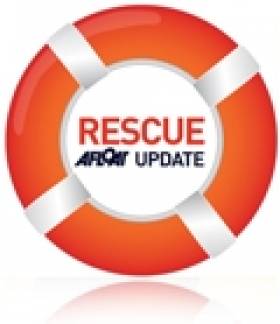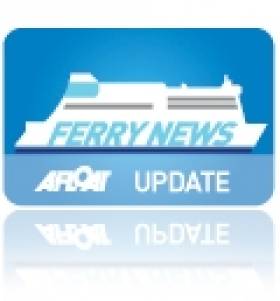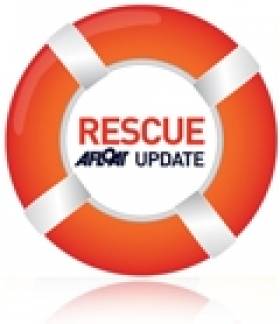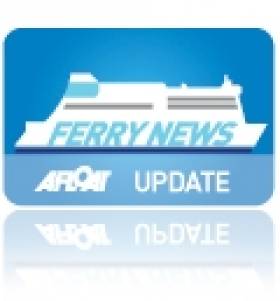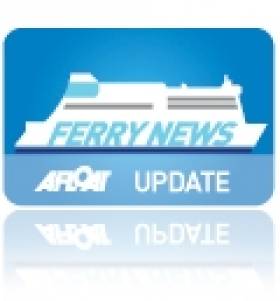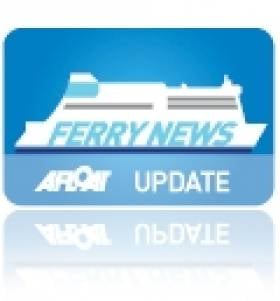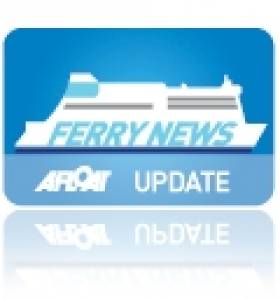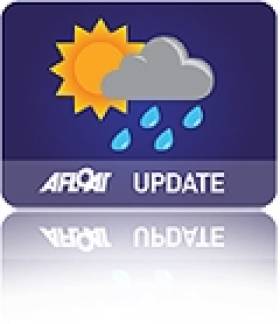Displaying items by tag: ferry
Greek Fire Ferry Cable Snaps, Killing Two
#NormanAtlantic - A cable used to tow the blaze-damaged Mediterranean ferry Norman Atlantic has snapped, killing two Albanian crewmen, the Daily Telegraph reports.
The incident is the latest in a series of tragedies since fire engulfed the lower decks of the Italian-registered vessel on Sunday 28 December.
As of last night the death toll had risen to 10, reports the Irish Examiner, with officials yet to confirm any people missing from the 478-name passenger manifest.
Some of the 427 people rescued in a difficult operation amid poor weather conditions are not listed on the manifest, suggesting they may have been travelling illegally.
The Guardian has an account from one passenger, British show-jumper Nick Channing-Williams, who described how his fiancee recalled hearing a loud bang early on Sunday morning before a burning smell wafted through the vessel.
Four Bodies Recovered In Greek Ferry Fire As Rescuers Battle Elements
#NormanAtlantic - RTÉ News reports that Italy has launched a criminal investigation into the blaze on the car ferry Norman Atlantic as the Greek government confirms the recovery of four bodies from the site of the disaster off Corfu.
As reported yesterday on Afloat.ie, the ferry sailing the Mediterranean from Greece to Italy called for help after a fire broke out in its lower decks.
Prosecutors will determine whether negligence played a role in the incident as rescue teams continue to battle the elements to evacuate more than 100 passengers who remain on the vessel.
The Guardian says four British nationals are among those rescued so far.
Meanwhile, according to The Irish Times, language difficulties between the crew of the Italian-registered ferry and its predominantly Greek passengers have posed problems on board.
Mediterranean Ferry With 466 Passengers 'Evacuated' After Fire
#Rescue - Some 466 people were being evacuated this morning from a car ferry that reported a fire on board while sailing from Greece to Italy this morning, according to RTÉ News.
As of 8am this morning Irish time, 130 people had been moved from the Norman Atlantic via a rescue boat to a nearby container ship some 44 nautical miles west of Corfu.
Passengers have described a lack of co-ordination in the evacuation effort since the fire broke out at 4am Irish time.
"They tried to lower some boats, but not all of us could get in," one person claiming to be a passenger told a Greek TV station by phone.
And as The Irish Times reports, poor weather in the area - with wind speeds of up to 88km per hour - has made the rescue effort "complicated".
“We are doing everything we can to save those on board and no one, no one will be left helpless in this tough situation,” said Greek shipping minister Miltiadis Varvitsiotis.
The incident comes almost three years after the wrecking of the Costa Concordia in the waters off western Italy.
RTÉ News has more on this developing story HERE.
36 Years In Jail For 'Sewol' Ferry Tragedy Captain
#Sewol - The captain of the ferry that capsized off mainland South Korea earlier this year, costing the lives of 304 people on board, has received a 36-year jail sentence for his part in the disaster.
But as RTÉ News reports, Capt Lee Jun-Seok was also acquitted of the murder of those who died in the incident on 16 April, from which just 172 of the 476 passengers and crew were rescued.
The court ruling that prosecutors had failed to prove the most serious charge, of "homicide through wilful negligence", which carries the death penalty.
Capt Lee's sentence comes after similarly lengthy terms handed down to three other senior crew members on the Sewol, which sank some 100km off the mainland on route to the popular tourist island of Jeju, as previously reported on Afloat.ie.
Most of those killed in the tragedy were high school students going on a field trip to the island – and controversy grew in the weeks after the incident as it emerged passengers were instructed to remain in their cabins despite the boat sinking rapidly.
RTÉ News has more on the story HERE.
Man Overboard From Rosslare Ferry, Bray Head Climber In Fall
#Rescue - RTÉ News reports on two separate coastal rescues off Rosslare and Bray Head yesterday (Sunday 12 October).
One man fell overboard from Irish Ferries' Oscar Wilde ferry sailing out of Rosslare Europort about an hour after leaving port.
The passenger was recovered from the water and returned to Rosslare, from where he was taken to Wexford General Hospital.
Meanwhile, earlier in the day another man was hospitalised with head and back injuries after a fall while climbing Bray Head with friends.
RTÉ News has more on the story HERE.
Truck Rolls Out of Back of Spanish Ferry – Video!
Never mind roll on, this lorry nearly rolled off! A truck driver is alleged to have forgotten to apply his brake aboard the Acciona Trasmediterranea roro ferry 'Alboran', operating between the Spanish towns of Algeciras and Ceuta. Whatever the reason for the runaway lorry, as the above vid shows, the fast ferry docks with the cab of the truck sticking out of the stern of the ship!
The extended vid below shows how the ships crew eventually got the lorry off the ship
{youtube}_R8jVxyyvZ8{/youtube}
Winter Ferry To Inis Mór Could Be No More
#AranIslands - Galway Bay FM reports on fears that winter ferry services to Inis Mór in the Aran Islands might end due to lack of Government funding.
Galway Senator Fidelma Healy Eames raised the issue in the Seanad last week, telling how the Galway Bay islanders have been lumped with travel and fare increases since the ceasing of a State-subsidised contract for Inis Mór's passenger ferry, and the failure to receive tenders for a new five-year contract.
It's already been reported that ferry visits to the Aran Islands have fallen by 20% in six years.
Irish Ferries Voted Best Ferry Company for Fourth Year in a Row
#ferries – Irish Ferries has been voted Ireland's Best Ferry Company for the fourth year in succession at the Irish Travel Industry Awards held in Dublin recently.
The award was bestowed on the company by a vote of Irish travel agents and comes in the week when the company launched its new weekend direct return service between Dublin and the French port of Cherbourg.
Providing what the company's head of passenger sales Dermot Merrigan said is 'a third route option that augments the company's existing services from Rosslare to Cherbourg and Roscoff', the new 19-hours service is operated by the ferry vessel Epsilon departing Dublin every Saturday afternoon and arriving Cherbourg the following morning. Sailings return later each Sunday in time to arrive back in Ireland on Monday morning.
#ferry – This weekend (Saturday, 18th January 2014), Irish Ferries will inaugurate its new direct weekend car ferry service between Dublin and the French port of Cherbourg. As previously reported, the new 19-hours service will be operated by the passenger car and freight ferry vessel Epsilon which the company acquired recently under a charter arrangement. Sailings will depart from the Ferryport terminal in Dublin at 15.30 hrs on Saturday and will arrive in Cherbourg at 11.30hrs on Sunday morning. It will return to Dublin later that day, departing Cherbourg at 17.00hrs arriving back in Ireland on Monday morning.
Third Route Option
The introduction of the new Dublin to Cherbourg service gives holidaymakers travelling into and out of Ireland a third route option, augmenting, as it does, the company's services from Rosslare to Cherbourg and Rosslare to Roscoff. Timed to arrive in Cherbourg early enough to facilitate easy onward travel to campsites and holiday centres throughout France, the new service is expected to prove popular with families and hauliers alike.
On board Epsilon, the once-weekly, year round service will offer a more limited range of cabins and passenger attractions when compared with those on board the company's cruise ferry Oscar Wilde which will continue to service routes from Rosslare to Cherbourg and Roscoff as before.
Bringing access to European motorways into the heart of Dublin city, the new service will extend the appeal of a motoring holiday in France to an even wider market. For those living in the northern half of the country, it eliminates driving to Rosslare and cuts the motoring time and cost involved.
MV Epsilon
Built in 2011, the Epsilon has capacity for 500 passengers. Modest facilities on board include a bar, cafeteria, self-service restaurant, 68 two and four berth cabins all with TV, free wi-fi service and 2,860 lane metres of vehicle deck parking space. Commenting Irish Ferries head of passenger sales, Dermot Merrigan said 'our new Dublin to Cherbourg direct service will appeal to those living within and beyond our capital city. Fast access straight through the city or from the Dublin Port Tunnel ensures that our new Ireland – France service will be more accessible to all.'
Fares and offers for this new Dublin to Cherbourg service can be viewed on the Irish Ferries website www.irishferries.com . When not operating on the Dublin to Cherbourg service, Epsilon will sail between Dublin and Holyhead increasing Irish Ferries services on the route to a maximum of twelve sailings each day.
UPDATED: Weather Warning For St Stephen's Day As Storm-Force Winds Sweep In
#Weather - Met Éireann has announced a national weather warning is in effect from later today (26 December) as storm-force winds are expected to reach speeds as high as 130km/hr in coastal areas.
UPDATE: As of late this morning, the weather warning level has been raised to RED with severe and damaging gusts of 120 to 140km/hr expected and 150km/hr gusts in exposed coastal areas. There is also a risk of very high seas with significant danger of coastal flooding.
The wind warning comes into effect from 5pm this evening and continues overnight and into tomorrow afternoon at 3pm.
As TheJournal.ie reports, ferry sailings have already been cancelled, and small craft are advised of the status level of 'Orange' as southerly winds are expected to increase to gale or strong gale force this afternoon on all coasts of Ireland and on the Irish Sea, and will veer southwest to west tonight while increasing to storm force at times.




























